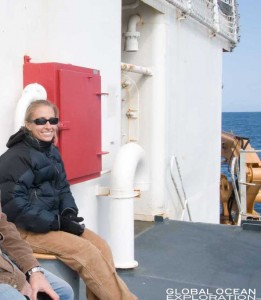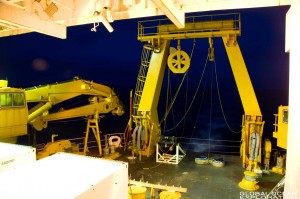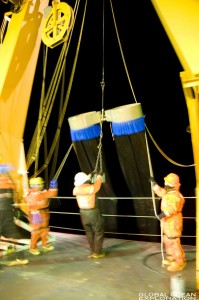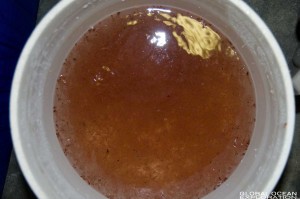
Today has been a slower day. The sun is shining and the sea is calm. It was a beautiful morning with temperatures around freezing here in the open water. We are heading towards the shelf edge to do some benthic sampling before heading back to our process station to assess any changes on our quest to find productivity and a possible phytoplankton bloom near the ice edge. It is a relatively quiet day on the ship with some samples being processed and others collected. Birds were hanging around the ship as we were on station with the multi-core in the water. We are in 500m of water so the sampling took a fair amount of time.Â
I took this opportunity to sit outside and look out at the Bering Sea and think about how beautiful and calm it is out here today and how quickly the weather out here can change. However, the weather maps indicate that a high pressure system is coming through so hopefully that means nice weather for the next few days.Â
As the day continued, the clouds took over the sunny sky and the sky became dreary. The seas remained calm. We are doing a zigzag pattern for our stations now and came into a productive area in deeper water.Â

I stayed up to see the net tows which happened around 1am. I was anxious to see what kind of critters were in the water. There were three net tows at this station and sure enough, there were lots critters in the water: copepods, krill, pteropods, polychaete worms and some little fish, among other critters too small to identify. The water is mostly filled with copepods which are small crustaceans. We are now headed north to our next station and tomorrow I will find out where we are going next. We should be back in the ice by Sunday so I am looking forward to that! Â
 The krill sampling team and the marine science technicians bring in the bongo nets in the darkness.
The krill sampling team and the marine science technicians bring in the bongo nets in the darkness.
 A bucket teeming with copepods, krill and other plankton. Without a microscope, it looks like thick red/orange soup.
A bucket teeming with copepods, krill and other plankton. Without a microscope, it looks like thick red/orange soup.
